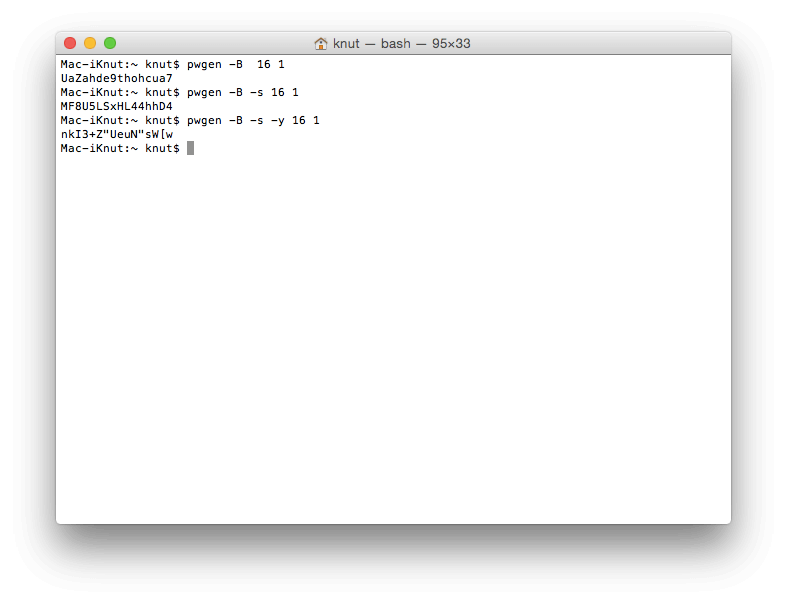
Lastly, let us run the Ansible playbook file install.yml as shown.
#Pwgen syntax update#
Uncomment the admin and password parameters and provide a secure admin password.Īdditionally, update the secret key variable with the secret key generated earlier. Next, open the inventory file in the same directory Now, create a 30 character secret key using the pwgen tool as belowĬopy this key and save it somewhere. Next, go into the installer directory inside the awx-17.1.0 folder Once unzipped, be sure to find the awx-17.1.0 folder in your directory.
#Pwgen syntax zip file#
Let us now download the latest AWX zip file from Github by using wget command as follows.

The following table gives the password length in characters for 40-bits, 128-bits, and 256-bits passwords when rendered in the various formats. The actual password length in characters depends on the chosen formatting. Import is supported using the following syntax: terraform import randompassword.password.
#Pwgen syntax install#
$ sudo pip3 install docker-compose=1.23.1 Password Generator generates passwords based on a given strength expressed in bits. result (String, Sensitive) The generated random string.
#Pwgen syntax software#
Next, we shall install the docker-compose module that matches your version of docker-compose. Generating a Random Password with ‘pwgen’ ‘pwgen’ is software for generating random passwords.It has provision for generating human memorable and pronounceable as.$ sudo apt install python3-pip git pwgen vim Use the commands below to install Node and NPMīefore anything let us first install git, pip, and when (password generator) Step 4: Install node and NPM(Node package manager)

We can configure servers and deploy applications with ease with Ansible, open-source server automation and software provisioning tool. Now change the permission of docker compose Also easy to remember passwords should contain different letters and numbers. group Easy to remember You can define your own password. $ curl -L “$(uname -s)-$(uname -m)” -o /usr/local/bin/docker-compose Create up to 500 passwords - with letters, numbers and special characters, and a length of up to 60 characters. In this guide, we are going to install Ansible AWX on Ubuntu 20.04 LTS system and Execute the ansible playbooks using AWX GUI.Īnsible AWX services will be deployed inside containers, and for that, we need to install docker and docker-compose to run multiple container images using the following command.įor docker-compose, we need to download the file via curl command and place it into the bin folder. It is an open-source version of Red Hat Ansible Tower. Here are some examples consult the man page for more options.Ansible AWX is a free and open-source front-end web application that provides a user interface to manage Ansible playbooks and inventories, as well as a REST API for Ansible. There are several ways to pass arguments to pwgen to generate passwords, depending on what parameters you need. For instance, on Fedora: $ sudo dnf install pwgen On Linux, you can install pwgen using your package manager.

It can intelligently select the appropriate WHOIS server for most queries. According to its man page, "the pwgen program generates passwords which are designed to be easily memorized by humans, while being as secure as possible." It returns multiple password options that meet the criteria you provide so that you can select the one that you prefer (and might be more likely to remember). This package provides a commandline client for the WHOIS (RFC 3912) protocol, which queries online servers for information such as contact details for domains and IP address assignments. It would be much easier to have a tool that generates secure passwords that meet whatever rules the website or application requires. Sometimes the rules for creating passwords are so strict that it's hard to get a good and allowable combination.


 0 kommentar(er)
0 kommentar(er)
